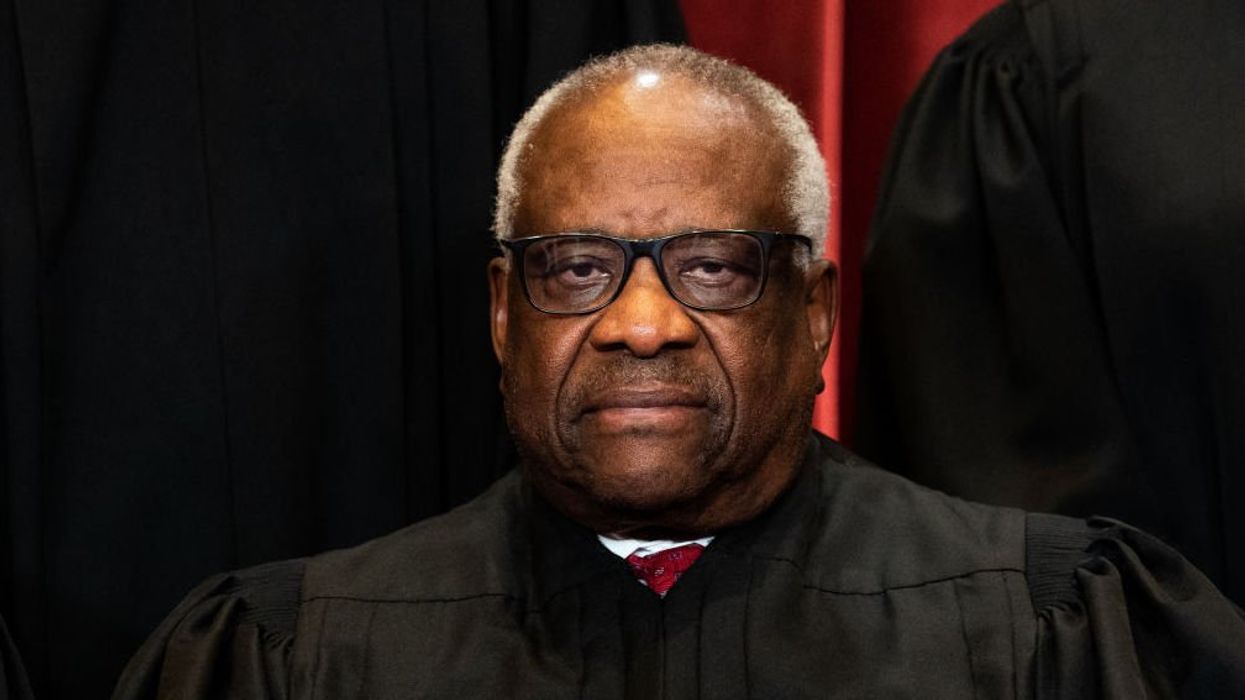
Erin Schaff-Pool/Getty Images

Justice Clarence Thomas wrote a blistering opinion supporting the high court's ruling against affirmative action programs at Harvard and the University of North Carolina.
In particular, Thomas extensively rebuffed Justice Ketanji Brown Jackson's dissent.
Though she joined the minority "without qualification," Justice Jackson wrote her own dissenting opinion to "expound upon the universal benefits of considering race in this context" because "[o]ur country has never been colorblind."
She argued that affirmative action programs are legal and necessary to atone for generational discrimination against black people in America, sins that have never been fully rectified.
"The only way out of this morass—for all of us—is to stare at racial disparity unblinkingly, and then do what evidence and experts tell us is required to level the playing field and march forward together, collectively striving to achieve true equality for all Americans," she wrote. "It is no small irony that the judgment the majority hands down today will forestall the end of race-based disparities in this country, making the colorblind world the majority wistfully touts much more difficult to accomplish."
In a concurring opinion spanning 59 pages, Thomas wrote to articulate "an originalist defense of the colorblind Constitution."
Deep into the opinion, Thomas explained his thesis:
Racialism simply cannot be undone by different or more racialism. Instead, the solution announced in the second founding is incorporated in our Constitution: that we are all equal, and should be treated equally before the law without regard to our race. Only that promise can allow us to look past our differing skin colors and identities and see each other for what we truly are: individuals with unique thoughts, perspectives, and goals, but with equal dignity and equal rights under the law.
For the next six pages, Thomas ripped into Jackson's argument.
"Rather than focusing on individuals as individuals, her dissent focuses on the historical subjugation of black Americans, invoking statistical racial gaps to argue in favor of defining and categorizing individuals by their race," he wrote. "As she sees things, we are all inexorably trapped in a fundamentally racist society, with the original sin of slavery and the historical subjugation of black Americans still determining our lives today."
Thomas, moreover, upended Jackson's claim that the majority asserts a colorblind utopia.
"I, of course, agree that our society is not, and has never been, colorblind," Thomas wrote.
Regardless of that reality, it does not erase the legal standard established by the 14th Amendment, Thomas explained, which declares "that the law may not sort citizens based on race." This, he noted, is diametrically opposed to Jackson's view.
"Justice Jackson’s race-infused world view falls flat at each step. Individuals are the sum of their unique experiences, challenges, and accomplishments. What matters is not the barriers they face, but how they choose to confront them. And their race is not to blame for everything—good or bad—that happens in their lives," he wrote. "A contrary, myopic world view based on individuals’ skin color to the total exclusion of their personal choices is nothing short of racial determinism."
In fact, Thomas argued that Jackson's push for race-based admissions "is not a vanguard of the innocent and helpless" — but will only "empower privileged elites."
Thomas also accused Jackson of perpetrating racial stereotypes and advancing an irrational argument that race-based government intervention will actually result in a net positive for everyone. Look no farther than students who are denied admission because of affirmative action, Thomas said.
"This vision of meeting social racism with government-imposed racism is thus self-defeating, resulting in a never-ending cycle of victimization," he observed. "There is no reason to continue down that path.
"In the wake of the Civil War, the Framers of the Fourteenth Amendment charted a way out: a colorblind Constitution that requires the government to, at long last, put aside its citizens’ skin color and focus on their individual achievements," Thomas declared.
Like Blaze News? Bypass the censors, sign up for our newsletters, and get stories like this direct to your inbox. Sign up here!